#The Doomsday Machine
Explore tagged Tumblr posts
Text
This was actually on TV tonight (7-18-2025) on the Channel "Heroes and Icons." Of course I watched it.

174 notes
·
View notes
Text


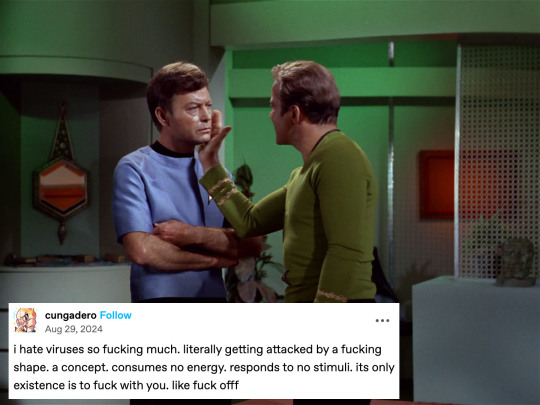



He is very very full of love and that is why he is so frustrated
#star trek#star trek tos#leonard mccoy#bones mccoy#jim kirk#spock#captain kirk#textpost meme#it's loveing bones hours#the doomsday machine#bread and circuses#the immunity syndrome#this side of paradise#the devil in the dark#plato's stepchildren#televisionenjoyer#cosmogenous2#catacini#cungadero#sexygaywizard#viva-1a-resistance#tumblr things#matt decker#viruses
539 notes
·
View notes
Text
Being in the process of watching post-TOS films right now, and having rather mixed feelings about it, there is something that probably surprises me the most about all of this. We talk a lot about AOS Kirk and even SNW Kirk (which Paramount tries to show us as the canon young Kirk) as being non-TOS-canon, very different readings of Kirk as a character, but we never really talk about the fact that Film!Kirk is an equally non-TOS-canon reading of the character.
ETA: this is going to be a very long post that I wanted to finish earlier, but my latest meltdown obviously didn't let me finish anything I had planned this week.
[there will be a bit of film criticism now, you can skip that right away and move on to criticizing Kirk's characterization… this really sounds bad, but don't get me wrong, I like post-TOS films, but they're so damn different and I want to talk about it]
The post-TOS films certainly lose all the noir and theatricality of TOS, all its épater la bourgeoisie, this legacy of old cinema (TOS, strangely enough, is completely a child of the golden age of Hollywod, and is much closer to "Casablanca" than to "Star Wars") by completely projecting itself into science fiction (which, to be honest, was the last thing TOS did at all, like they flew in space, of course, but it was such an obviously special transcendent type of space, where you would rather meet Socrates than Xenomorph) and outright militarism.
Perhaps the most shocking moment in "The Motion Picture", and my personal point of no return in the sequels, was one of the opening scenes in the Enterprise's transporter room. The ship wasn't ready to leave yet, and the transporter wasn't working properly, but two crew members were sent out of the Starfleet transporter room, and they… just died in the process (why?). This wasn't negligence on the part of the ship or the crew; it was clearly blatant negligence on the part of Starfleet, and it was presented so quickly and dryly as if it were a fairly routine situation for everyone. They were a little upset, shook their heads, and went off to more pressing matters. It was an absolutely unnecessary scene for the plot (the only thing it affects is the appearance of a vacant science officer position on the ship, which, like, could’ve been vacant anyway? these scene is generally never mentioned again, you could just not add it at all), meaningless and cruel in its absurdity, which perfectly highlights the changes in the approach to the display of violence between the 60s and 80s.
[Enterprise transporter room] RAND: Do you read me Starfleet? Override us. Pull them back! STARFLEET [OC]: Unable to receive their pattern, Enterprise. KIRK: Give it to me. Starfleet, boost your matter gain, we need more signal! ...More signal! SCOTT: We're losing their pattern. RAND: Oh, no! They're forming! WOMAN: (a scream) SONAK: (a moan) KIRK: Starfleet, do you have them? STARFLEET [OC]: Enterprise, ...what we got back didn't live long, ...fortunately. KIRK: Starfleet, ...Kirk. Please ...express my condolences to their families. Commander Sonak's can be reached through the Vulcan Embassy. There was nothing you could have done, Rand. It wasn't your fault.
All of these things were the result, in political and cultural changes, the growth of noticeable gloom in science fiction, and mostly changes that the film industry experienced after the 1960s (the rapid development of technology, the expansion of the audience, and the attempt to move away from the theatrical relic of the past to spectacular films) and in the sequels this is felt not only in the script, which emphasizes dynamic scenes and is much more simplified in literary terms, but also in the acting, which is already much more static and tied to the camera (the acting is one of the reasons why TMP is so difficult to watch, apart from the frankly weak direction and editing, and despite the pretty good [still very Roddenberry-esque with all this love is a touch but not a touch] plot, which is quite funny, because the fact that this is happening against the background of the character of Ilia, who really plays a non-human /a body/ that uses a computer, doesn’tt improve the situation in any way, because none of the actors look noticeably more alive than her, and the only glimpse of emotion in the entire film is the scenes between K/S, which is of course very sweet, but…).
First of all, this concerns Shatner, who is actually a very good theatrical actor (and criticism of his performance in TOS is completely incomprehensible to me). Where he is absolutely alive, natural, and sincere in the noir, theatrical TOS, he is exhausted, stiff, and (I'll be honest) repulsively arrogant in the films’ blockbusterness and their efforts to be dramatic. I partly attribute this to the fact that, like me, he is completely unsuited to dark hair and it turns our lives into a Nietzschean abyss, but more likely the combination of his ego and inability to realize himself played a bad joke on him, and he lost something real, really important in the pursuit of attention. But that's why the K/S interaction scenes in the films (and all the Kirk scenes that involve Spock in any way) are so surprising to me, because they're the only scenes where Shatner suddenly sheds all of his ego, arrogance, and discontent, becoming again... sweet, alive, and natural in his acting, and sincere in his absolute admiration and warm love for the one important person in Kirk's life, and it's such a contrast to his acting at other times that I'm just, I don't know, Bill, what are you doing? He just sees Spock, and bang, he becomes a completely different person. In any case, Shatner's changes and internal conflicts have their impact on the character's formation and perception in the films, but they are only part of the bigger picture.
[end of films criticism, let's move on]
"The Motion Picture", our ground zero in Kirk drift, generally sets this emphasized masculine tone in Kirk's portrayal from the very beginning, clearly departing from both his gender-ambivalence and his noir femme fatale, and becoming quite constrained even in his nature of utopian humanism. In my conversation with my sister, I joked that it was quite funny that they were trying to convince us that TOS Kirk, who had survived genocide (famine, mass murder, psychological/physical abuse, and clearly read SA) at 13, and then went through a mass massacre on a ship he served in his 20s, for which he blamed himself, had become this in a few years of paperwork. The midlife crisis had apparently erased even his traumatic experiences. I generally understand the idea they were trying to show - a real captain who is tired on solid ground and more than anything in the world wants to return to space, and even more - to his ship, the only place where he was truly happy + (this is of course not so obvious, but it's damn visible in Shatner's acting and in subsequent K/S scenes) this existing gap between him and Spock is a tangible trauma and Spock's absence in his life breaks him to pieces. But, even with this idea of growing up/(literally) returning from heaven to earth, Kirk's behavior in TMP frankly doesn't align well with his characterization in TOS.
We see several consecutive scenes of his conflict with Decker, the acting captain of the Enterprise, whom he removes from his post by order of Starfleet, and although Decker himself is a rather static character, in whose development not much effort was put, in all these scenes, he is clearly... right.
KIRK: I'm taking over the center seat, Will. DECKER: You're what? KIRK: I'm replacing you as Captain of the Enterprise. You'll stay on as Executive Officer. Temporary grade reduction to Commander. DECKER: You personally, are assuming command? KIRK: Yeah. DECKER: May I ask? Why? KIRK: My experience, five years out there dealing with unknowns like this, my familiarity with the Enterprise, this crew. DECKER: Admiral, this is an almost totally new Enterprise. You don't know her a tenth as well as I do. KIRK: That's why you're staying aboard. I'm sorry, DECKER: No, Admiral. I don't think you are, not one damn bit. I remember when you recommended me for this command. You told me how envious you were, and how much you hoped you'd find a way to get a starship command again. Well, it looks like you found a way.
KIRK: All right, explanation? Why was my phaser order countermanded? DECKER: Sir, the Enterprise redesign increases phaser power by channelling it through the main engines. When they went into anti-matter imbalance, the phasers were automatically cut off. KIRK: Then you acted properly, of course. DECKER: Thank you, sir. ...I'm sorry if I embarrassed you. KIRK: You saved the ship. DECKER: I'm aware of that, sir. KIRK: Stop ...competing with me, Decker! DECKER: Permission to speak freely, sir? KIRK: Granted. DECKER: Sir, you haven't logged a single star hour in two and a half years. That, plus your unfamiliarity with the ship's redesign, in my opinion, sir, seriously jeopardises this mission.
We are also given an emphasis on how Kirk puts pressure on his crew:
KIRK: Programming ready? DECKER: Programme set for standard warp entry, Captain, ...but I still recommend further simulation study. KIRK: Mister Decker, every minute brings that object closer to Earth! Engineering! Stand by for warp drive. SCOTT (on intercom): We need further warp simulation on the flow sensors. KIRK: Engineer, we need warp speed now! McCOY: Jim, you're pushing. Your people know their jobs.
It's not that he's never done it before, but there's a literally physically palpable difference in how and when it happened in TOS and how it happens in TMP, and how truly unjustified (apart from wanting to seem significant and controlling again) Kirk's behavior in TMP is.
He also, not particularly justified, takes a risk by allowing that weird electric thing onto the bridge, which leads to further tragic events.
KIRK: Mister Decker? DECKER: I advise caution, Captain, we can't withstand another attack. KIRK: That thing is twenty hours away from Earth. We know nothing about it yet. DECKER: That's precisely the point. We don't know it will do. Moving into that Cloud, at this time, is an unwarranted gamble. KIRK: How do you define 'unwarranted'? DECKER: You asked my opinion, sir. ... DECKER: Ilia! ...Ilia! (the probe with Ilia disappears) DECKER: This is how I define unwarranted!
In fact, this whole Kirk vs Decker situation is an obvious paraphrase of "The Doomsday Machine", where the same Kirk vs Decker conflict is played out (god, it's not even funny), but with the roles reversed. Kirk now finds himself in the role of an older, more experienced man, but it’s his self-confidence, obsession with an idea, fear of being rejected, and his apparent conflict as an authority figure against the younger and more brilliant captain (ok, it's not about TMP Decker, but you get the idea) that prevents him from being truly flexible and leads to abuse of power. Of course, TMP Kirk handles this situation better than TOS Decker (but he was also not in a state of traumatic shock after the death of his team at the time of the events).
I understand what they meant by this (ok, again), but it's such a blatant misreading of TOS Kirk as a character that I'm starting to think that even AOS Kirk at some points was read much closer to TOS Kirk (maybe not really, but even in the face of the obvious opposition between the two, AOS Kirk got his clearly existing psychological trauma/unhealthy coping patterns and (coincidentally, this was definitely not planned in the heteronormativity of the reboot) his sexual ambivalence) than Film!Kirk. Now I understand much better where this concept of the Golden Boy of Starfleet, the lucky guy who easily gets out of any situation, a kind of exemplary good young man who has had no real difficulties in life, or terrible PTSD or anything shameful, disgusting, dirty, that you want to forget, in his past, came from. The 2009 film (thank's aos) gave new life to this, clearly emphasizing the key difference between AOS/TOS Kirk - the presence of parental support (although it's not like Kirk's parents were ever actually mentioned in TOS, which makes this concept pretty meaningless in light of TOS):
KIRK: Wait. Where you came from, did I know my father? SPOCK PRIME: Yes. You often spoke of him as being your inspiration for joining Starfleet. He proudly lived to see you become Captain of the Enterprise.
And of course, there's that important line between Kirk and David in TWOK, which is obviously easy to read as "the loss of Spock has become such an all-encompassing and overwhelming grief for Kirk that nothing can compare to it" (the films unexpectedly turned out to be even more romantic than the series, which is partly exacerbated by the fact that they lose TOS in the plot and K/S becomes just the only palpably real thing on which it’s based at all), but it actually works very strangely with the TOS Kirk’s death experience, by crossing out the very existence of this:
DAVID: Lieutenant Saavik was right. You never have faced a death. KIRK: No, not like this. I haven't faced death. I've cheated death. I tricked my way out of death ...and patted myself on the back for my ingenuity. ...I know nothing.
I patted myself on the back for my ingenuity. I honestly think about these words in the context of Kirk's words in Obsession /No man achieves Starfleet command without relying on intuition, but have I made a rational decision? Am I letting the horrors of the past distort my judgment of the present?/ and it somehow doesn't fit together at all. How can a man who has lived for over 10 years with a constant paranoid sense of guilt for the deaths of about 200 people through his own mistake consider a survival experience as cheating death and commendable ingenuity? And of course, another obvious thing that doesn't fit together is his Tarsus IV experience. Even if we imagine that somehow Kirk managed to escape a truly horrific experience and that he could’ve saved his own life through trickery and ingenuity, this absolutely contradicts his characterization in TOS. He was a child (at that borderline age when traumatic experience is particularly merciless in its memories), he saw four thousand people die, he experienced a terrible famine (which is hinted at repeatedly in TOS), violence, and experiences of violation of personal physical/psychological space (which is hinted at even more in TOS). "The Conscience of the King" is a beautiful episode in its complexity, which actually gives us enough to understand how fundamentally traumatic these events are, and how much they have influenced Kirk's increasingly (humanistic) worldview:
KIRK: What were you twenty years ago? KARIDIAN: Younger, Captain. Much younger. KIRK: So was I. But I remember. Let's see if you do. Read this into that communicator on the wall. It will be recorded and compared to a piece of Kodos' voice film we have in our files... ... KARIDIAN: (reading) The revolution is successful, but survival depends on drastic measures. Your continued existence represents a threat to the well-being of society. (stops looking at the paper) Your lives means slow death to the more valued members of the colony. Therefore I have no alternative but to sentence you to death. Your execution is so ordered. Signed, Kodos, governor of Tarsus Four. KIRK: I remember the words. I wrote them down. You said them like you knew them. You hardly glanced at the paper. KARIDIAN: I learn my parts very quickly. KIRK: Are you sure? Are you sure you didn't act this role out in front of a captive audience whom you blasted out of existence without mercy? … KARIDIAN: Or is. Kodos made a decision of life and death. Some had to die that others might live. You're a man of decision, Captain. You ought to understand that. KIRK: All I understand is that four thousand people were needlessly butchered.
It honestly surprises me how a character who was written as someone who had more than one experience of mass slaughter, which he witnessed at a young age, suddenly begins to be interpreted as someone who never really encountered death, but only trickery and ingenuity avoided it. TOS Kirk is obviously a player, an actor, a pirate, and a seductress, a person who is really capable of using all available methods to survive/to save others, but all of these actions of TOS Kirk are, and this is actually well written and consistently shown to us, the result of the fact that he has really faced death, and is very well aware of what it is. This is not empty /I don’t believe in no-win scenarios/ this is a clear awareness of what price you have to pay to survive things like genocide. A person who pays that price, who goes through something like that, will never say that they have ingeniously escaped death or that they are lucky.
This reminded me of a very stupid conversation I had with my coworker about Dostoevsky, he's obviously one of my least favorite writers, and talking about him on a special level means just ruin the day, but in this conversation we touched on the topic that Dostoevsky was supposed to be executed, but at the last moment, literally before the shooting, he was pardoned, such an inhumanly cruel experience that forever broke his psyche and affected all his subsequent work, to which my coworker just said, "Exactly, he's such a lucky guy.” I thought for a long time about what to answer him, and I realized that it wasn't like I really had the words for it. Some experiences are the exact opposite of winning a lottery ticket, and living with the memories of them can be more unbearable than death itself, sometimes the price of survival is too high, but even if you get through it, it stays with you forever, and TOS actually talks a lot about these things, but it was hardly something that was really thought about in the 80s.
Spock's death would undoubtedly be the most terrifying and personally difficult experience in TOS Kirk's life, but it wouldn't be the first. It wouldn't be that first terrifying shattering, first shock of a great loss, but it would be the last straw, that point in the chain of all these endless losses and loneliness and pain, after which there would hardly be anything else. It would read much closer to the quiet absolute doom of Yanagihara's "A Little Life" ending than to what we see in TWOK. And while this scene is particularly touching for understanding the K/S relationship, it would have had much more meaning if this confession /No, not like this/ had occurred against the backdrop of Kirk's already existing horrific death experience, the reminder of which is a constant line in TOS, rather than against the backdrop of completely erasing this experience from the plot, reducing it to a simple /I cheated death because I don't believe in no-win scenarios/ simplifying both Kirk as a character and Spock's true significance in his life.
#i obviously have to apologize for the length of this text#but i think i have a lot of thoughts on this#i hope i'll be in better working shape tomorrow#it's better to have hyper-fixation than a meltdown#frances talking#long post: st#star trek#star trek tos#star trek aos#james t kirk#s'chn t'gai spock#kirk/spock#k/s#spirk#the motion picture#wrath of khan#the doomsday machine#obsession#the conscience of the king#f: poetic cinema#c: that's how you do it' by remembering who and what you are#c: logic is the beginning of wisdom' not the end#otp: two halves of one soul#st: more content from the secretly british shakespeare nerd#st: everybody suffers on a starship#(obviously) criticism of post-TOS films#tw: genocide#tw: sa mention#tw: death mention
77 notes
·
View notes
Text
Something about how Jim became so accustomed to Starfleet parlance that it’s the only parlance he can speak at all. Something about how his relationship with his ship and his work as Captain extends to language as well, to the way he handles and expresses his emotions.


Amok Time – Kirk is confronted with the fact Spock keeps a dangerous secret that, if not shared, might end up with his first officer killed

The Apple – With the landing party marooned on a strange planet and the USS Enterprise being pulled ever closer to the ground, Kirk asks Scotty something beyond excellence.


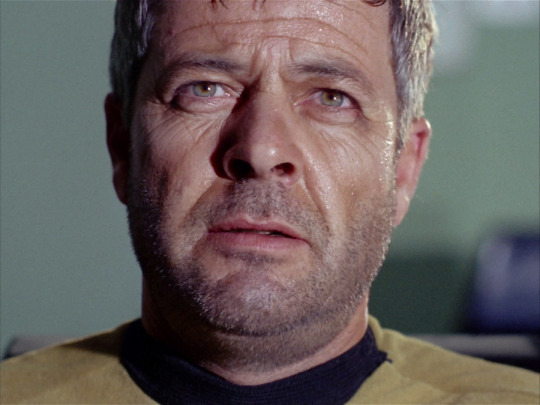
The Doomsday Machine – Commodore Matt Decker stands in the maw of a monster with a dead crew and stripped of any will to live. Kirk tries to bring his old friend to reason, but nothing else can be done for Decker as he looks death in the eye.
I understand how, especially in the third instance with Matt Decker, he might've seemed cold (your buddy is about to off himself, and you remind him the higher-ups spent too much money on his formation), but I see it more as Kirk trying to ground both himself and his friend (who is also a Commodore, might I remind you) than simply reducing Decker to his position.
It also accidentally reveals a lot about Jim (although reveal is not the best word, as that same thought has been explored in numerous episodes before), how much his sense of worth is tied to his job—to how well he can perform and excel at it.
But that's not all he's saying. In both instances (Amok Time and Doomsday Machine), Kirk puts himself in the Federation's place because he sees its recognition as more valuable, more "worth living for" than his own.
It's his way, the way of a man who knows no life other than that of servitude, of saying I care about you, and I don't want to lose you.
It's really tragic that it is not enough to save Decker. If both Matt and Jim share the belief (which appears more often than not in Starfleet overachievers) that your inner worth is tied to how well you can perform it, Matt is left face to face with the rather morbid fact that he failed severely and his whole crew is dead because of it.
To sin is human, yes, but if the Doomsday Machine is the Devil, as the Commodore himself put it, it truly is a shame Decker did not view himself as deserving of forgiveness
#something something to err is human are you even really one when you pilot such a beast like a uss starship#cali speaks#star trek tos#the doomsday machine#the apple#amok time#spirk#james t kirk#jim kirk#kirk#s'chn t'gai spock#mr spock#spock#matt decker#uss enterprise#meta#star trek
166 notes
·
View notes
Text



Star Trek Enterprise "In a Mirror, Darkly Pt. 2"
Worth comparing Sulu and Mayweather looking thru their respective viewers:


And also how they pop out of the console:


I just think it's neat.
#Star Trek Enterprise#Enterprise#In a Mirror Darkly#In a Mirror Darkly Pt 2#Star Trek#TOS#The Doomsday Machine#Mirror Mirror#Hikaru Sulu#Travis Mayweather#Mirror Mayweather#Jonathan Archer#Mirror Sulu#Mirror Archer#startrekdaily#startrekedit#entedit#enterpriseedit#Secret Enterprise Rewatch#Hide and Queue
270 notes
·
View notes
Text
Kirk on The Doomsday Machine acting like a stubborn child whose favorite toy was taken away:

45 notes
·
View notes
Text
The Official List of Episodes in which Kirk's Gorgeous Tits are the Main Character now also includes The Doomsday Machine
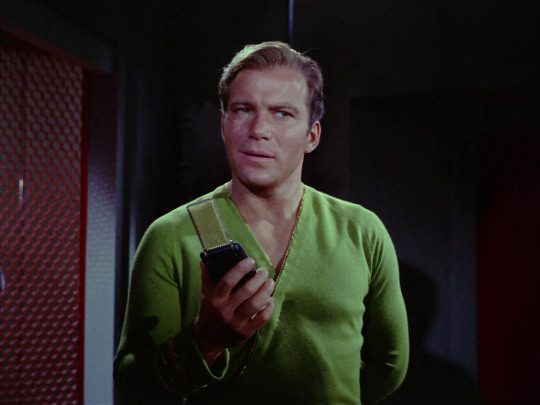
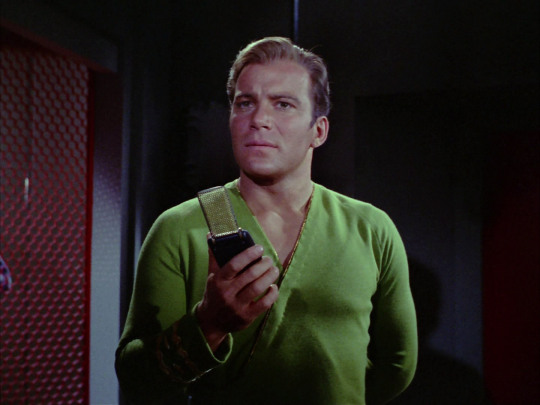
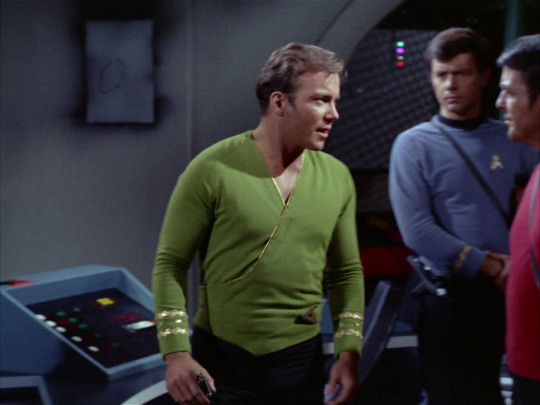

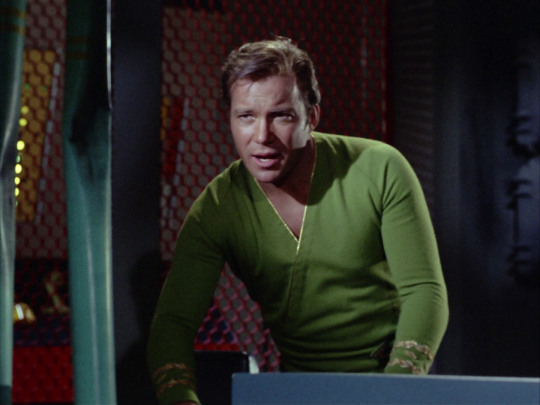
gratuitous ass bonus

#jiddies appreciation post#kirk's slutty green wraparound shirt appreciation post#beautiful kirk#james t kirk#star trek tos#the doomsday machine#others on the list include#the apple#and#bread and circuses#sim speaks#my posts
44 notes
·
View notes
Text
jim in doomsday machine: "i dont want to talk to you, stinky commodore decker. put my boyfriend on the phone >:("
48 notes
·
View notes
Text
Review: Star Trek: The Original Series Season Two
Rating: 9/10
Fantastic! Absolutely fantastic! So many different Star Trek classics in this season, and it was truly the peak of the show. The cast pairings became solidified, and the synergy was at an all-time high. When I think classic Kirk-Bones-Spock moments, I think Season Two.
What follows are spoilers for a handful of great (and one or two bad) episodes of the season. Logically, I would avoid these spoilers until watching the episodes, but humans are rarely logical creatures, Captain.
Hands down, my two favorite episodes of Season Two (and even in the top 5 for the entire show) are The Doomsday Machine and The Ultimate Computer, both for similar reasons.
Strengths:
While The Doomsday Machine (S2E6) is a fairly standard retelling of a classic story in a new and interesting setting, this one being Moby Dick, the impact of the story is not lessened by this knowledge. The story begins as the Enterprise discovers the wreck of the USS Constellation, NCC-1017, and Captain Decker as her only survivor. It was destroyed by the Planet Crusher, an enormous Bugle chip that can destroy entire planets in a single pass. Decker's crew beamed down to a planet in order to escape the crippled ship, but were instead killed by that weapon. The acting, while hammy, is never disingenuous, and the madness in Decker wanting at all costs to destroy the Planet Crusher, even at the risk of loosing the Enterprise, is palpable and downright big screen worthy. Kirk uses the barely space-worthy Constellation as a makeshift weapon, arming the impulse reactors as a makeshift nuclear weapon. The climactic destruction of the Constellation, the last second escape of Kirk, and the message that 'this was the only time when nuclear weapons have been used to save,' was nothing if not timely, given the original air date in autumn of '67.
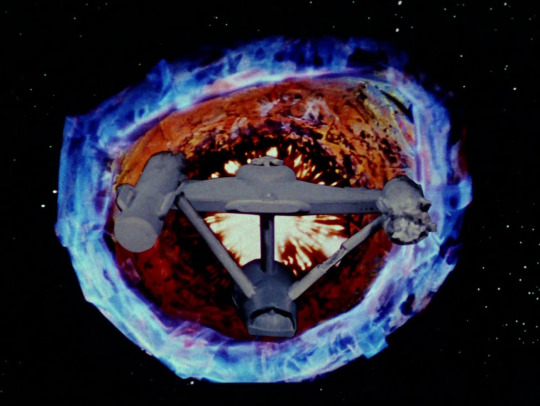
And, of course, The Ultimate Computer (S2E24) is no different in quality. The Enterprise was selected to test the M-5 Computer as a replacement for human operators aboard a starship. Of course, Kirk and the gang, with the exception of Spock, are dubious in their belief that the M-5 can replace them. Dr. Daystrom (played by the excellent William Marshall, an African-American playing a doctor in 1967) assures them that the computer is completely safe, and will ensure future crews won't perish to the unlimited dangers of space. The computer, however, begins to take full control of the ship, not listening to override codes or commands. All of this as she is to participate in a non-lethal wargame with four other Constitution-class ships, the Lexington, Excalibur, Potemkin, and Hood. En route, the M-5 destroys an unmanned freighter, hinting at the carnage to come if they cannot disable the computer. Without being able to warn the fleet, or stop it from operating, the Enterprise opens fire with full-powered phasers, killing 53 aboard the Lexington and all aboard the Excalibur. The palpable horror, even with the original cheesy special effects, is not diminished, as we watch the Chekhov, Sulu, Uhura, and the rest of the gang as they destroy an entire vessel. Kirk flies off the handle, and, after Spock neutralizes Dr. Daystrom, he convinces the M-5 that it violated its programming, the preservation of life, and that it needed to be punished. Absolutely A+ acting.
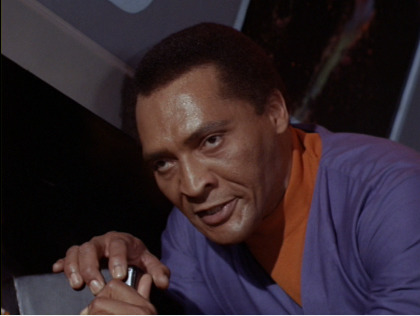
Of course, any discussion of Season Two would be incomplete if it failed to mention either The Trouble with Tribbles or Mirror, Mirror. The first of these is perhaps the most famous of all episodes, due just to how silly but endearing it is. Truly an episode where it's not trying to make an important point or be profound, but one of the greatest episodes of the original show. Mirror, Mirror (S2E4) has been so important that it has been referenced or outright continued in nearly every subsequent production of the Star Trek universe. Deep Space Nine, Enterprise, Discovery, and Prodigy all explicitly mention or visit the Mirror universe, and the concept of our heroes acting in exactly the opposite way as they normally do, and becoming the worst version of themselves, is such an interesting and thought-provoking story. Of course, while most of our heroes are evil in the Mirror universe, nothing can stop Miles Edward O'Brien from being just the greatest man.
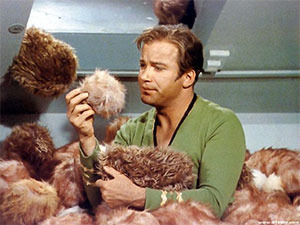
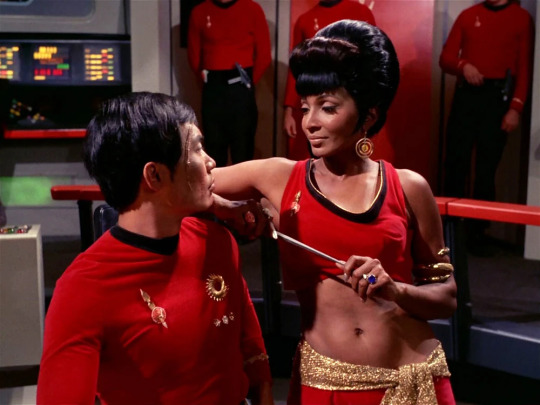
There are plenty of other banger episodes, like Journey to Babel (our first look at other Federation member races like the Andorians and the Tellarites), Obsession, A Piece of the Action, Immunity Syndrome, Private Little War, and Patterns of Force. Just watch it already!
Weaknesses:
Season Two has less in the way of weak episodes than Season One, that's for certain, but there is one absolute garbage episode, truly keeping Season Two from a 10/10 for me. It's The Omega Glory. The episode starts of normal and intriguing. The Enterprise discovers the Exeter in orbit of a planet, completely abandoned. Upon boarding the ship, we discover that the crew have been reduced to salt crystals for an unknown reason. Alright, we've got our hook! It's good, even. They beam to the planet to find a very 19th century humanoid culture, known as the Kohms. They have the appearance of Asians, a key part of this story. The former captain of the Exeter is here, and in control of these Kohms. According to him, they have secured the fountain of youth, and that leaving this planet will reduce the away team to the crystalline residue left aboard the Exeter.
Okay, to me we're starting to loose the plot, but I'll let it cook.
The Captain of the Exeter warns that the Kohms are under attack by a group of savage barbarians known as the Yangs. These savages are white, with blond hair. To me, this was an interesting reversal of the traditional Civilized and Savage stereotypes. Having the white men and women reduced to this stereotype usually reserved for non-whites was thought provoking. However, it soon lost any respect I had for it.
Shortly after, we learn that the Yangs were forcibly removed from their birthright lands long ago. Kirk learns that Kohms and Yangs are corruptions of Communists and Yankees (a very stupid plot point, I may add), postulating that this is Earth if it took a very different course of history. And, the cherry on the cringe cake was the Yang reverently appearing with an American flag, and bearing the Constitution. The cheesy studio orchestra rendition of the Star-Spangled Banner nearly made me click the episode off in second-hand embarrassment. Nothing, not even Spock's Brain is worse than The Omega Glory.
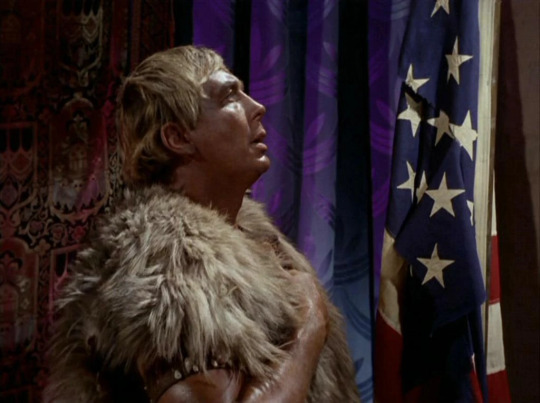
In summation, Season Two of TOS is perhaps the best Trek there is with the original crew, with perhaps the exception of a couple of the films. If you haven't seen it, there's so much more that I haven't spoiled that will make it worth while.
#i'll review anything#star trek#star trek tos#tos#james t kirk#spock#leonard mccoy#bones mccoy#the doomsday machine#the ultimate computer#mirror mirror#the trouble with tribbles#the omega glory#miles edward obrien my beloved
12 notes
·
View notes
Text
The Doomsday Machine: The USS Enterprise encounters the wrecked USS Constellation and its distraught commodore who's determined to stop the giant planet-destroying robot ship that killed his crew.
The Empath: Trapped in an alien laboratory, Kirk, Spock and McCoy meet an empath and are involved in a series of experiments.
Feel free to reblog in order to help this poll reach the most people! Remember to vote on the other polls in this round, listed here!
#star trek tos#star trek#james kirk#bones mccoy#spock#star trek bracket#elimination game#leonard mccoy#star trek poll#jim kirk#the doomsday machine#the empath#guys I know the empath is a tumblr darling#but c’mon#the doomsday machine is sooo good#deforest kelley#would not agree with me#since his fav is the empath lol#spirk
23 notes
·
View notes
Text


Please reblog so others can participate
Find a link to the other polls here
Episodes that won so hard they automatically get to go to the finale under the cut:
Amok Time Here & Here
14 notes
·
View notes
Text
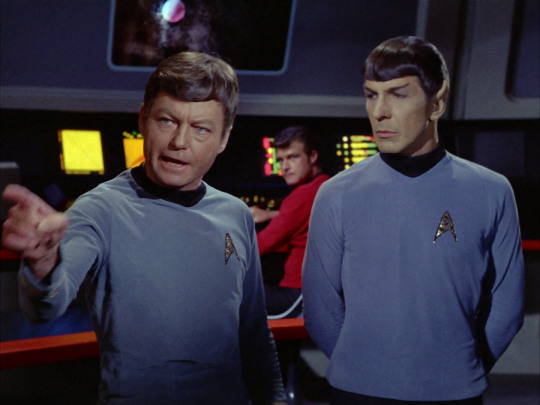
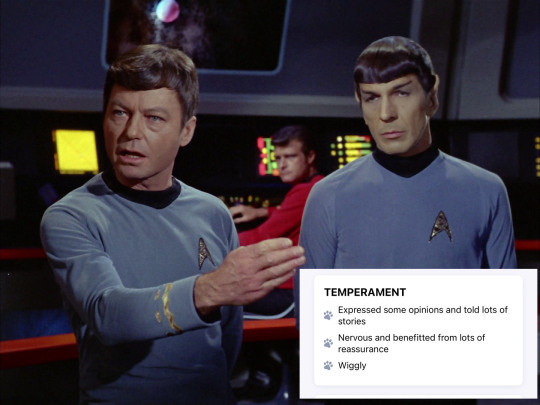
Fully believe Spock rated him this way at least once
Source
#star trek#star trek tos#leonard mccoy#spock#spones#bones mccoy#textpost meme#the doomsday machine#lt leslie#dan hon#biscuit the cat#ty fex for showing me the original post
203 notes
·
View notes
Text
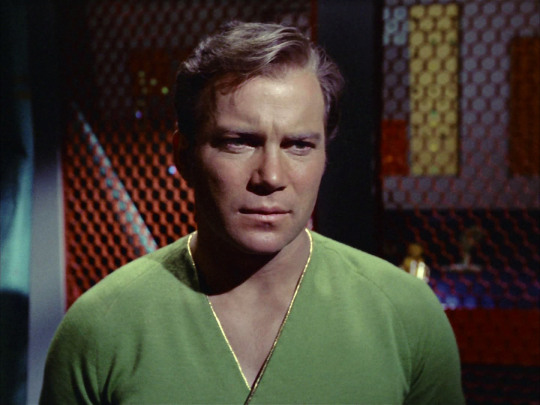
I watched S2EP6 "The Doomsday Machine" yesterday, and it's honestly one of the best episodes of TOS (I also watched S2EP7 "Catspaw" today, and it was pretty bland in comparison). It's actually wildly good drama and acting, and in terms of its structure and emotional tension, it resonated strongly with S1EP14 "The Conscience of the King" for me. This is probably one of the best episodes for Kirk as a character. And it's also a great episode of exemplary teamwork by the Enterprise, especially in the higher chain of command. So I find it strange that it's so rarely mentioned in the context of K/S, because it's simply the best demonstration of their exceptional mutual understanding. And how they absolutely and completely trust each other in the decisions they make and the actions they take.
In fact, it was so good and so intense that I even heard an emotional "Hug each other finally!" from K in the end.
#frances talking#star trek#star trek tos#the doomsday machine#james t kirk#s'chn t'gai spock#kirk/spock#k/s#spirk#f: poetic cinema#c: that's how you do it' by remembering who and what you are#c: logic is the beginning of wisdom' not the end#otp: two halves of one soul#thoughts while i watch tos
66 notes
·
View notes
Text

#Star Trek#The Doomsday Machine#Constitution Class#U.S.S. Enterprise#U.S.S. Constellation#NCC-1701#NCC-1017
30 notes
·
View notes
Text
Spock is so fucking hot in this one AUGH. Leonard Nimoy put his whole pussy into this 60 odd years ago specifically in order to fluster me today. yes baby girl recite regulations from memory and face off with this dick head newcomer asserting power he doesn't deserve.
18 notes
·
View notes
Text
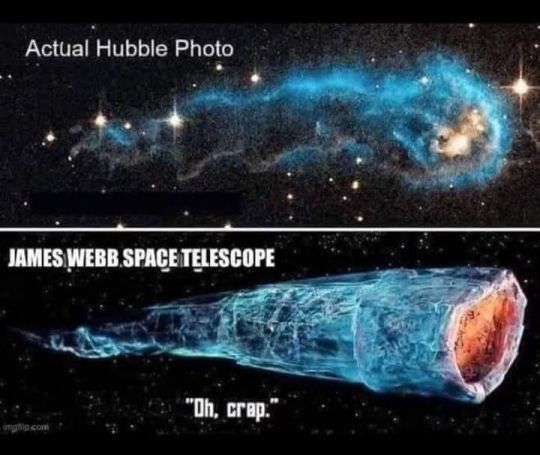
"Oh, crap" indeed!
49 notes
·
View notes